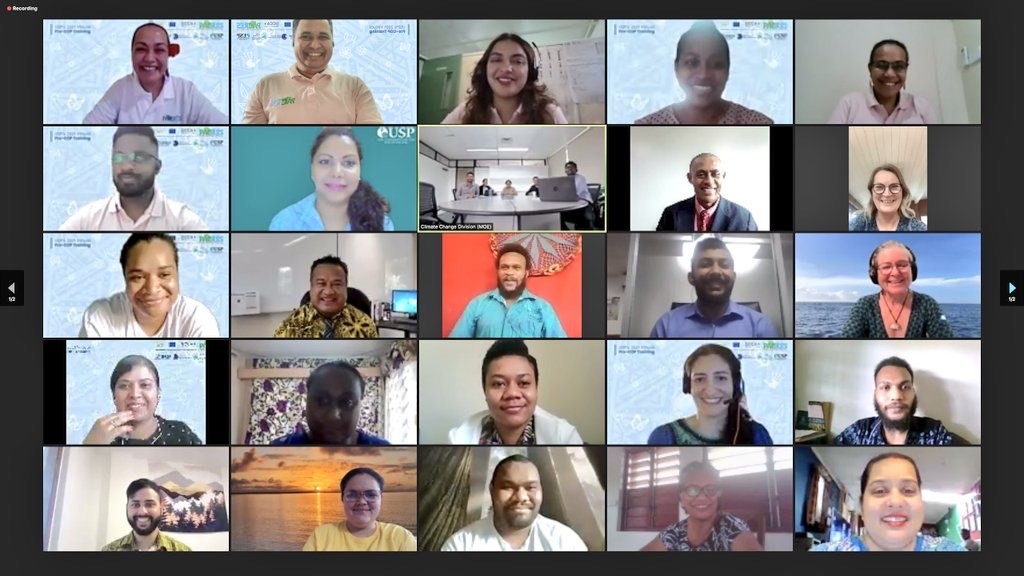Related News

Seven postgraduate students from The University of the South Pacific (USP) will support the Fijian, Solomon Islands, Tuvalu and Vanuatu Government delegations by observing the negotiations that will be fundamental to securing the future of our planet during the COP 26 United Nations Climate Change Summit.
The COP 26 event from November 1 – 12 will be hosted by the United Kingdom in partnership with Italy and will be held in Glasgow, Scotland.
The core group will be supported by an additional ten USP students, who will provide research and analytical briefings that will be essential working documents for the core group.
This is a unique opportunity for University students to attend events centred on the United Nations Framework Convention on Climate Change (UNFCCC) negotiations. It also highlights USP’s academic and research capabilities in climate science and policy.
The students are supported by the European Union-funded Intra-ACP GCCA+ Pacific Adaptation to Climate Change and Resilience Building (PACRES) project. To prepare and support these students for the COP 26 event, the PACRES project organised a three-day virtual pre-COP training from September 28 – 30.
Opening the USP virtual pre COP 26 training, Acting Deputy Vice-Chancellor Education, Professor Jito Vanualailai acknowledged the on-going financial support of the European Union though the PACRES project.
“The European Union Global Climate Change Alliance (EU GCCA) project, implemented by USP over 2010–2017, has supported 19 students and three staff members at the UNFCCC COP negotiations since 2012,” he said.
“The University of the South Pacific continues to build the capacity of young climate change leaders in the Pacific Island countries. The pre-COP training aims to further this effort by building the capacity of young climate negotiators in the Pacific region to ensure that the regional organisations in the Pacific have dedicated operational and institutional capacity serving the needs of Pacific Island nations about relevant Intra-ACP GCCA+ concentration areas, climate negotiations and the implementation of the Paris Agreement.”
“I wish our USP students the best as they prepare for the November climate summit. Remember, you are not only climate youth ambassadors – you are The University of the South Pacific’s young climate ambassadors,” Professor Vanualailai said.
The Delegation of the European Union for the Pacific’s Deputy Head, Dr Erja Askola said the European Union is particularly pleased to partner with USP in supporting, empowering and giving youth a safe space to discuss their views & expectations ahead of COP 26.
“In the EU, we regard youth – young people in general, young adults and students and listening to their views and concerns in the area of climate change is all the more important as you know it is the youth and future generations that will be bearing the consequences of our actions today,” she said.
“And many of the young students of today will be the decision-makers of tomorrow and we do need to take youths seriously and give them a voice.”
The USP component of the EU PACRES project is hosted at the Pacific Centre for Environment and Sustainable Development (PaCE-SD) at the University’s lower campus in Suva.
Professor of the Ocean and Climate Change & Director of PaCE-SD, Professor Elisabeth Holland said, “It is an honor to be on this journey to empower our incredible Pacific students and youth. I am so proud of the success of our students who have served the Pacific in leading the way forward.”
“I thank the European Union, our Youth and the NGOs including the Pacific Council of Churches for the inclusive #StrongerTogether approach.”
USP PaCE-SD, Master of Science in Climate Change student and PaCE-SD Student Association President, Ms Salote Nasalo is enthusiastic and empowered to support the Fijian delegation at the Glasgow climate summit.
The student climate advocate says as environmentalists and climate change advocates and future leaders for our Oceania, youth advocates must not wait on their Governments and civil societies for actions on climate change.
“Tackling the climate emergency requires a revolution in everything we do and that includes universities. The good news is that the generation of students coming into our campuses is ready for this action. If we want change, we need to start that chain reaction by taking small steps from within,” she said.
“We are ordained as custodians of our fenua, vanua and our land, passed down from our forefathers and we should keep it for our future generations.”
Ms Nasalo encouraged her peers with her ‘Be the Change’ mantra.
More than 35 participants registered for the USP PACRES virtual pre-COP 26 training. Participants included representatives from PSIDs, Government officers, youth groups, civil society organisations, Faith-based organisation, PACRES partners (SPREP, SPC and PIFS) and the USP students.
The training covered UNFCCC, COP structure and processes, PSIDS priorities for COP 26, student support and expectations at COP 26, climate finance, climate diplomacy, climate change and faith-based organisations, ocean and climate, youth and climate change and communicating climate change at a COP event.